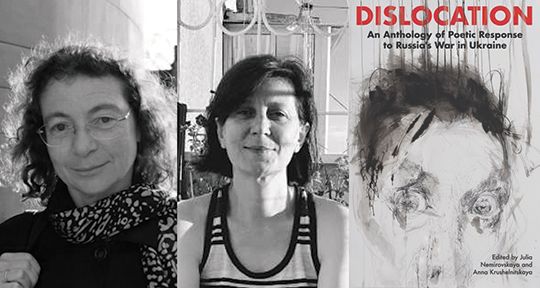Dislocation: An Anthology of Poetic Response to Russia’s War in Ukraine, edited by J. Nemirovskaya & A. Krushelnitskaya, Slavica Publishers, 2024
In the second year of the war in Ukraine, even the title of this bilingual tome confirms my observation that recent anthologies may remind one of diagnostic manuals. Thankfully, there is no need to diagnose a breakage; while Russian aggressors have persisted in their assault, Ukrainian resistance is relentless. Ukrainians are still fighting for their land, and the land is more than territory; it means real people and individual stories. Yet, as such stories demonstrate, dislocations—occurring in the wake of global trauma—take a long time to heal. There is a palpable incompatibility between realities past and present, pain amounting to chronic, and ruptures shaping both local and international discourses into liminalities. Beyond the battlefield, injuries beyond broken bones proliferate in the form of shifted responsibilities, wounded memories, betrayed values, and faulty beliefs; at the end of the day, even the mysterious “Russian soul” has turned out to be an inflamed spirit of contradiction.
Dislocation is edited in a way that critics of different disciplines can equally appreciate its logic, reminding one that when life’s plot betrays us in its twists, we are still left with words. In the last days of February of 2022, the Moscow-born author, director, and Russian culture scholar Julia Nemirovskaya announced through social media that she would be collecting poetic responses to the war in a kopilka—a “piggy bank” in Russian—for safekeeping; this resulting collection has slowly turned into a historical document. Moved by the incessant thought that “the world must be made aware,” volunteer translators began working on poems that they found poignant, and by the end of that year, the first bilingual collection, Disbelief, was published in London. In the nearly two years that followed, the geographies and demographics of contributing authors continued to widen, and two new translators—Yana Kane and Josephine von Zitzewitz—joined the original team of Dmitry Manin, Maria Bloshteyn, Anna Krushelnitskaya, Andrei Burago, and Richard Coombes. Their work proves to be precise and emotionally relevant, and Dislocation houses 117 authors in translation, ranging from Russian citizens and expats to Ukrainian poets who write in Russian (their native albeit traitorous language), featuring a stunning cover with art by Maria Kazanskaya. READ MORE…

